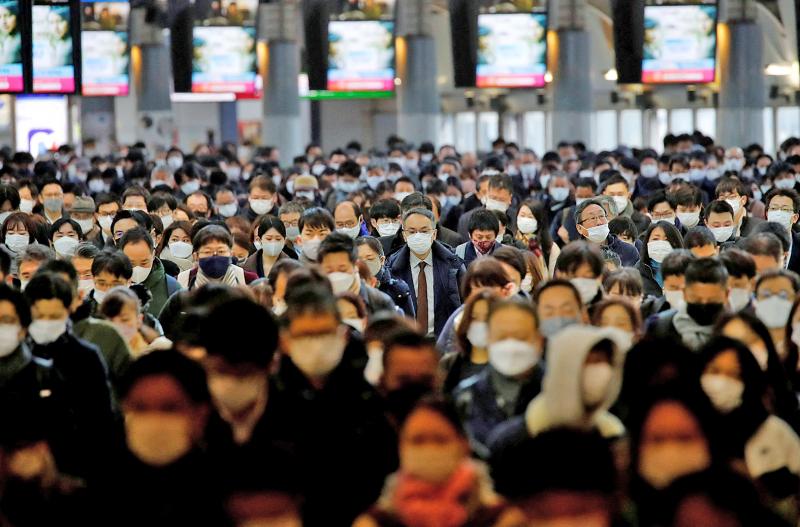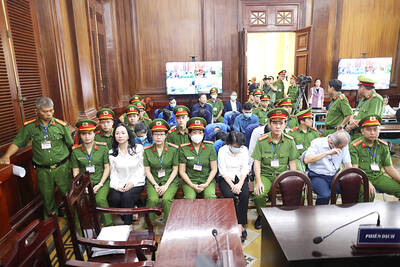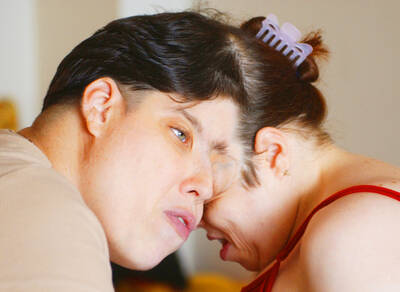Japan is considering stricter COVID-19 disease prevention measures in Tokyo and its three surrounding prefectures as soon as this week as a new wave of infections fills up hospital beds, local broadcaster Fuji News Network reported yesterday, without citing a source.
Japanese Prime Minister Fumio Kishida is expected to speak with ministers and make a decision as early as tomorrow, the report said.
The government might include Mie and Kumamoto prefectures in the quasi-emergency measures, as well as Kanagawa, Saitama and Chiba prefectures, which encircle Tokyo, it said.

Photo: Reuters
In Tokyo, home to the greatest number of cases, about 19 percent of hospital beds designated for COVID-19 patients were occupied as of Sunday.
Tokyo Governor Yuriko Koike has said she would consider seeking quasi-emergency measures when that figure hits 20 percent.
Japan reported more than 25,000 new cases each day over the weekend, from just double-digit cases a month ago.
The nationwide daily case count is closing in on the record from August last year.
The number of severe cases rose by just two on Sunday, bringing the total to 235, data compiled by national broadcaster NHK showed.
Japan did not report any deaths on Sunday, NHK said.
Tokyo on Sunday recorded 4,172 new cases, more than triple the number a week ago.
The majority of the infections were in people in their 20s and 30s. New cases in children 10 years old or younger rose to 294, risking clusters that could lead to schools being closed.
As recently as last month there were days when the capital logged zero new cases among young children.
The Omicron variant of SARS-CoV-2 was suspected in 84 percent of a sample of sequenced cases in Japan between Jan. 3 and Jan. 9, Japanese Ministry of Health, Labor and Welfare documents showed.
Almost 80 percent of Japanese have received two shots of a COVID-19 vaccine, one of the highest proportions among developed nations.
Japan is rolling out booster vaccinations to health workers and older people, and plans to boost the rest of the population starting in March.
Children under 12 would not be vaccinated until the health ministry expands the use of vaccines to those aged five to 11 from March at the earliest, Japanese Chief Cabinet Secretary Hirokazu Matsuno told reporters last week.
The quasi-emergency measures are already in place in three prefectures — Okinawa, Yamaguchi and Hiroshima — until the end of this month.
The decision allows local governors to make requests to shut bars and restaurants as early as 8pm and limit dining to groups of five people.
They can also urge companies to reduce the number of employees working in offices.

Republican US lawmakers on Friday criticized US President Joe Biden’s administration after sanctioned Chinese telecoms equipment giant Huawei unveiled a laptop this week powered by an Intel artificial intelligence (AI) chip. The US placed Huawei on a trade restriction list in 2019 for contravening Iran sanctions, part of a broader effort to hobble Beijing’s technological advances. Placement on the list means the company’s suppliers have to seek a special, difficult-to-obtain license before shipping to it. One such license, issued by then-US president Donald Trump’s administration, has allowed Intel to ship central processors to Huawei for use in laptops since 2020. China hardliners

A top Vietnamese property tycoon was on Thursday sentenced to death in one of the biggest corruption cases in history, with an estimated US$27 billion in damages. A panel of three hand-picked jurors and two judges rejected all defense arguments by Truong My Lan, chair of major developer Van Thinh Phat, who was found guilty of swindling cash from Saigon Commercial Bank (SCB) over a decade. “The defendant’s actions ... eroded people’s trust in the leadership of the [Communist] Party and state,” read the verdict at the trial in Ho Chi Minh City. After the five-week trial, 85 others were also sentenced on

Conjoined twins Lori and George Schappell, who pursued separate careers, interests and relationships during lives that defied medical expectations, died this month in Pennsylvania, funeral home officials said. They were 62. The twins, listed by Guinness World Records as the oldest living conjoined twins, died on April 7 at the Hospital of the University of Pennsylvania, obituaries posted by Leibensperger Funeral Homes of Hamburg said. The cause of death was not detailed. “When we were born, the doctors didn’t think we’d make 30, but we proved them wrong,” Lori said in an interview when they turned 50, the Philadelphia Inquirer reported. The

RAMPAGE: A Palestinian man was left dead after dozens of Israeli settlers searching for a missing 14-year-old boy stormed a village in the Israeli-occupied West Bank US President Joe Biden on Friday said he expected Iran to attack Israel “sooner, rather than later” and warned Tehran not to proceed. Asked by reporters about his message to Iran, Biden simply said: “Don’t,” underscoring Washington’s commitment to defend Israel. “We are devoted to the defense of Israel. We will support Israel. We will help defend Israel and Iran will not succeed,” he said. Biden said he would not divulge secure information, but said his expectation was that an attack could come “sooner, rather than later.” Israel braced on Friday for an attack by Iran or its proxies as warnings grew of